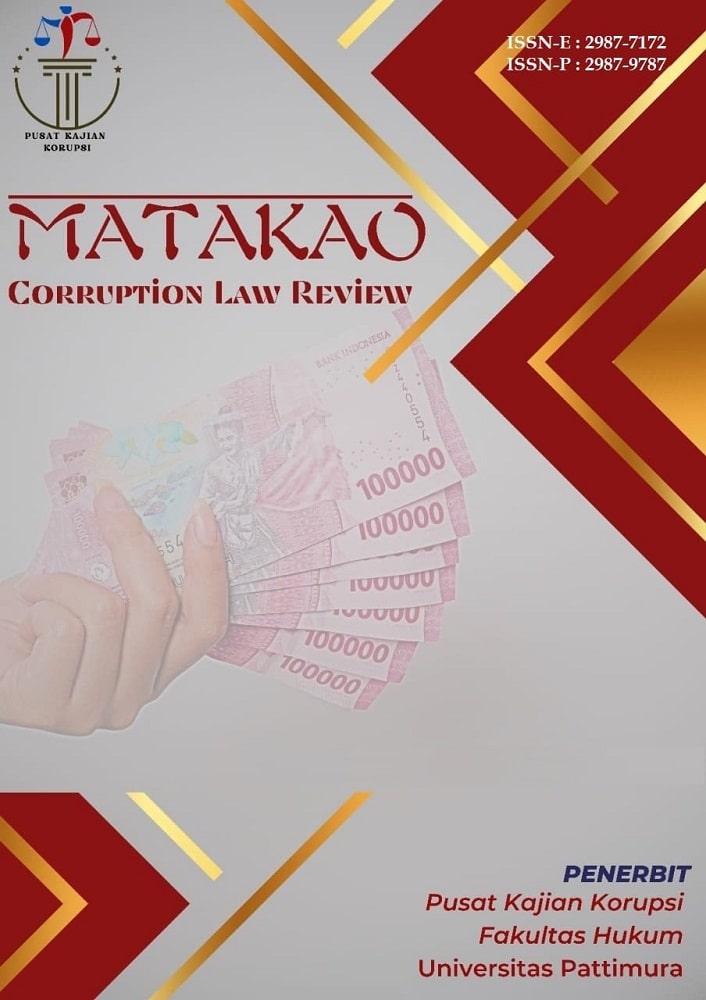Eksistensi Kewenangan Komisi Pemberantasan Korupsi Terhadap Eksekusi Putusan Tindak Pidana Korupsi Berdasarkan Ketentuan Hukum Yang Berlaku
Abstract
Introduction: Corruption is like a disease that arises one after another that can bring destruction to economic, political, socio-cultural, and state security aspects.
Purposes of the Research: Analyze the KPK's authority to execute corruption verdicts based on applicable legal provisions.
Methods of the Research: The research method used in this paper is normative legal research or library legal research, and a statutory approach and conceptual approach. The sources of legal materials used are primary and secondary legal materials. The technique of collecting legal materials is through literature study, namely by searching for legal materials by reading, seeing and listening and searching the internet, then the data will be analyzed using objective theories related to the relationship between variables which are then described to solve the problem which is the purpose of this research.
Results of the Research: Prior to the amendment of the law on KPK, the authority and duties of the institution were regulated in Article 6 letter c of Law No. 30 of 2002 on KPK. Then based on Article 50 of Law Number 48 of 2009 concerning Judicial Power Jo Article 1 paragraph 1. Article 8 paragraph 1 and Article of Law Number 16 of 2004 concerning the Prosecutor's Office of the Republic of Indonesia Jo Article 270 of the Criminal Procedure Code, it is explained that the executor is the authority of the prosecutor under the Supreme Court, both in general cases and special criminal cases. It is also stated that if the KPK exercises the authority to execute the corruption court decision, then the KPK has exceeded the limits of its authority so that the execution violates the principle of legality or is invalid and null and void. Juridically, the Attorney General's Office is the only institution authorized by law to execute court decisions that have permanent legal force.
Downloads
References
Anastia Sumakul, “Hubungan dan Kewenangan Komisi Pemberantasan Korupsi dan Kejaksaan Dalam Menangani Tindak Pidana Korupsi.”Lex Crimen 1, no.4 (2012): 94-110.
Harly Clifford Jonas Salmon. (2023). Kata Dapat Merugikan Keuangan Negara Dalam Undang-Undang Tindak Pidana Korupsi dan Undang-Undang Perbendaharaan Negara. MATAKAO Corruption Law Review, 1(1), 19-27. https://doi.org/10.47268/matakao.v1i1.9042.
Khoirur Rizal Lutfi dan Retno Anggoro Putri, Optimalisasi Peran Bantuan Hukum Timbal Balik dalam Pengembalian Aset Hasil Tindak Pidana Korupsi, Undang: Jurnal Hukum, Volume 3 Nomor 1 Tahun 2020, hlm. 35 https://ujh.unja.ac.id/index.php/home/article/view/119.
Rangga Trianggara Paonganan, “Kewenangan Penuntutan Komisi Pemberantasan Korupsi dan Kejaksaan Dalam penanganan Tindak Pidana Korupsi di Indonesia,” Lex Crimen 2, no. 1 (2013): 21-36.
Sudikno Mertokusumo, Mengenal Hukum Suatu Pengantar, Yogyakarta: Liberty, 1999.
Copyright (c) 2024 Harly Clifford Jonas Salmon, Astrid Hilarry Purwanto, Angelia Hilarry Lyshandra (Author)

This work is licensed under a Creative Commons Attribution-NonCommercial 4.0 International License.
Copyright:
Authors who publish their manuscripts in this Journal agree to the following conditions:
- The copyright in each article belongs to the author, as well as the right to patent.
- Authors are able to enter into separate, additional contractual arrangements for the non-exclusive distribution of the journal's published version of the work (e.g., post it to an institutional repository or publish it in a book), with an acknowledgment of its initial publication in this journal.
- Authors are permitted and encouraged to post their work online (e.g., in institutional repositories or on their website) prior to and during the submission process, as it can lead to productive exchanges, as well as earlier and greater citation of published work.
- Authors have the right to self-archiving of the article (Author Self-Archiving Policy)
Licence : This Journal is disseminated based on the Creative Commons Attribution-NonCommercial 4.0 International license terms. This license allows anyone to copy and redistribute this material in any form or format, compose, modify, and make derivatives of this material for any purpose. You cannot use this material for commercial purposes. You must specify an appropriate name, include a link to the license, and certify that any changes have been made. You can do this in a way that is appropriate, but does not imply that the licensor supports you or your use.

This work is licensed under a Creative Commons Attribution-NonCommercial 4.0 International License..












